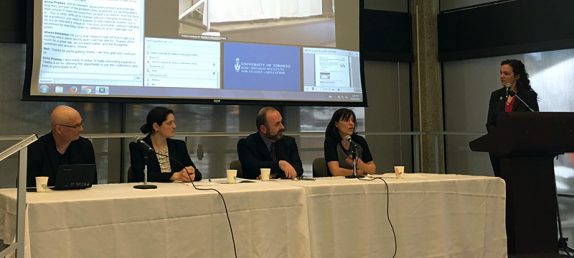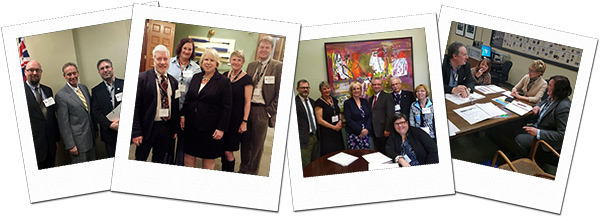Are books a condition of our labour? Do we need libraries with stacks and physical collections? Recent discussions within libraries across the country have highlighted faculty anxiety and displeasure with the fate of university libraries, as cuts are made to purchasing and operating budgets, collections culled, and the very nature of acquisitions transformed by changes in the methods of conducting and disseminating our research. Are libraries not an intrinsic part of our working conditions? How can we teach a student about the history of slavery, for example, if they do not have access to a wide range of interpretive sources that reflect changes in the writing of history over time? How can we encourage students to seek out many different kinds of evidence and to ask new and innovative questions, if libraries do not offer a variety of materials from a variety of different time periods? How can we encourage students to be venturesome and curious if they can no longer browse shelves? Those of us at smaller institutions long ago gave up the idea of having a ‘research’ library, but we do need very basic book collections, as well as collections of government documents and other sources that have not been digitized and, in fact, may never be. Without these, our teaching will be impoverished and our students’ learning will too.
Faculty are genuinely concerned with finding the best balance of resources for our libraries, but some feel consultation has been rather meager. On the one hand, the availability of material online and digitally has brought an array of new resources for teaching and research to our faculty and students; this has enriched our teaching, expanding the materials we can work with and opening up new doors of teaching possibility. However, faculty in the Humanities and Social Sciences are also facing severe cuts to book budgets, despite the fact that monographs remain a key form of the dissemination of our research. Not all books are available as e-books and students use e-books differently than hard copies – endnotes are obscured, browsing is discouraged. Moreover, existing hard copies of books may remain available only as hard copy for a long time.
All these issues have been highlighted recently at Trent University, where renovations to the library are not only necessitating a shut-down and relocation of the library for a year (May 2017 to May 2018), but a plan to cull the print collection by 50%. 250,000 items will be discarded. The figure is rather staggering. Figuring out how to do this, how to make selections, has been a difficult conversation, with some faculty believing that the university is moving too quickly and should explore storage or other solutions rather than de-accessioning books bought with taxpayer and donor money. While the Trent library is being made into what some tout as a “library of the future,” existing collections will find their way to abandoned retail outlets for storage for one year. Archives and rare books will be moved to former Shoppers Drug Mart store downtown and the circulating collections will go to a former Giant Tiger store, with requests for off campus holding.
The controversy over the sad fate of books made its way into the local newspaper. Seven million dollars in federal funds were secured (for an estimated 14 million dollar or more project) to renovate the library, to fix long-standing maintenance issues and create new spaces for “innovation.” On two floors, there will be study and meeting spaces dedicated to specific areas that the university wishes to highlight, such as entrepreneurship, ageing, and Indigenous studies. These will be designated the Bata Research and Innovation Cluster.
When concerns were expressed about the loss of books, Trent President Leo Groake was quoted in the local Peterborough Examiner as saying libraries cannot just be “museums for old paper” (PE, Oct 12, 2016). He pointed out that paper books are being replaced with digital ones (some truth to that) and that “Students these days – they’re in the digital age.” Some were not amused by the glib dismissiveness of the book as a key part of university learning. After some concerns were expressed, the president was given a column in the paper to qualify his remarks and do some damage control. “I do not believe that books are out of date. At the same time, I do think that libraries are changing; that this will reduce the room for books; and that it is a change for the better.” The move to digital books, he argued, was opening up space “for meeting others, and for interacting, intersecting, researching and collecting and analyzing data.” (PE, Oct 28, 2016) However, his statement belies a critical point: it is not only books that have been digitized that will be discarded in this process. Instead, it will include works no longer considered “relevant” at this particular point in time.
Faculty remain concerned. Discarding 50% of a library’s physical collection will have an impact on faculty, students, and members of the broader community. Moreover, materials considered irrelevant today may be useful tomorrow, and innovative ideas may be sparked by a book that has not been examined in twenty years. The idea that only dinosaur faculty want books while modern ones are into digital resources creates an unnecessary dichotomy and, furthermore, obscures the fact that materials subjectively deemed “un-useful” are in jeopardy. The letter below was sent to the president to try and persuade the administration that better solutions might still be found. Must the reconceptualization of libraries entail significant losses to physical collections? What possibilities and opportunities are lost if we do not preserve the library’s physical collections? For many of us, the consequences of not preserving, enhancing, and maintaining both digital and physical collections are deeply troubling.
Post contributed by Janet Miron and Joan Sangster, faculty members at Trent University.
The following letter was sent to the President concerning the library:
Dear President Groake,
I respectfully send you this letter, which is supported and endorsed by the Department of Anthropology, the Executive Committee of the Frost Centre for Canadian Studies and Indigenous Studies, and the School for the Study of Canada. We would like to express our concern for the physical collection of Bata Library and the university’s plan to discard a sizable portion of it.
For years, many of us have struggled to accept declining library budgets for the purchasing of books. To meet our research and teaching needs, we have had to weigh carefully which books to request for purchasing. We have done our best to cope with this challenge and to try to mitigate the effects as much as possible; we have accepted this situation with the belief that some sacrifice was necessary for the university’s fiscal health. Nevertheless, this has been a demoralizing experience for many of us, one that has taken a toll on our research and our teaching.
However, we now are not only facing the prospect of not replenishing and building our collection, but the substantial reduction of what many of us feel is an already meagre and inadequate collection. A whopping 50% of the library’s physical collection, an estimated 250,000 sources, slated for removal. We feel the library’s collection, built with tax-payers’ dollars and private contributions, is a fundamental part of the university’s well-being. If discarded, this crucial part of our library and our university could never be restored again. If the materials are replaceable, the cost would be in the millions of dollars. In light of the increasing recognition of Trent as a research and teaching institution of higher learning, why would we discard a part of our library that is important to many of us, one that directly contributes to our ability to achieve those very things we are so proud of?
At this moment, faculty have been “invited to provide feedback” on the deselection of the library’s physical collection, to identify materials that we need for our research and teaching. How can some of us reasonably do this? In five years, two years, even one year, the books and printed documents we need will change, possibly very dramatically. How will this affect our research? How will our students write research papers, which often require them to employ books or printed materials that have not been digitized? It is not simply recently published monographs and digitized sources that many of us need. We need older materials from decades ago, books that help us to understand how thinking, approaches, and foci have shifted and, thus, offer crucial direction to and foundations for our own research and teaching. Many of us want our students to know how scholars have written about topics in the past and how scholarship has changed. Doing so opens up thinking about where we need to go next and what new questions need to be considered. How can students do this with only a small selection of books in the library? How can we evaluate printed sources for their “value” today and predict what will be important to future generations of researchers and students? Books and other printed materials have both intrinsic and extrinsic value, and we feel strongly that it is in the university’s best interest to preserve the library’s collection, this body of knowledge, and to protect future endeavours and insight. Discarding half of our physical collection will undermine the research and teaching possibilities for many.
A library is a repository that offers manifold possibilities for researchers and students, but it should not be assumed that a repository is a stagnant, stale, or un-dynamic place that simply holds materials and gathers dust. Rather, it is that very repository that allows many of us as academics and students to ask new questions, to find relevance in a government report, collection of poems, monograph, or other source that has not been used for twenty years, to see things in a different light, to contextualize our research questions and findings, and to be creative and curious about the world around us. A Canadian geology book from 1920 may seem “un-useful” today, but tomorrow’s researcher may find it relevant for its list of Anishinaabemowin place names. For many of us in the humanities or social sciences, we need books and other printed materials, and we need to preserve them. Libraries and their physical collections form a vital part of our research methods.
Not only are many of us dependent on physical materials, but we also need the stacks of a library. Serendipity is one of the most exciting, rewarding, and fruitful possibilities offered by a library, the ability to browse the shelves and be distracted by a book that simply catches one’s eye. This part of research fosters inquisitiveness, reflection, curiosity, and open-mindedness. Retrieving a library book often entails much more than finding one specific book; it entails the discovery of other sources on nearby shelves that offer critical context, insight, or perspective, a process that cannot be replicated by on-line searches or is greatly limited when confined to only digitized materials. Many of us cannot solely rely on the digital world. For research and pedagogical reasons, we depend on a library, a library that is filled with books and not simply chairs and tables in a wired environment. It is very easy to find the latter if one so wishes in an urban setting. For many of us, we cannot do our research, teach, and develop ideas without a library and its physical collection. We do not have other university libraries to turn to in the Peterborough region, a dependency on inter-library loans is problematic, and digital resources, while important, are limited in many fields of research.
We urge you to reconsider the decision to discard half of our library collection and to find a solution that does not entail such loss. For many of us, our library’s physical resources are foundational to our work.
Sincerely, Janet Miron, Department of History
Letter Endorsed by:
The Department of Anthropology
The Executive Committee of the Frost Centre for Canadian Studies and Indigenous Studies
The School for the Study of Canada








